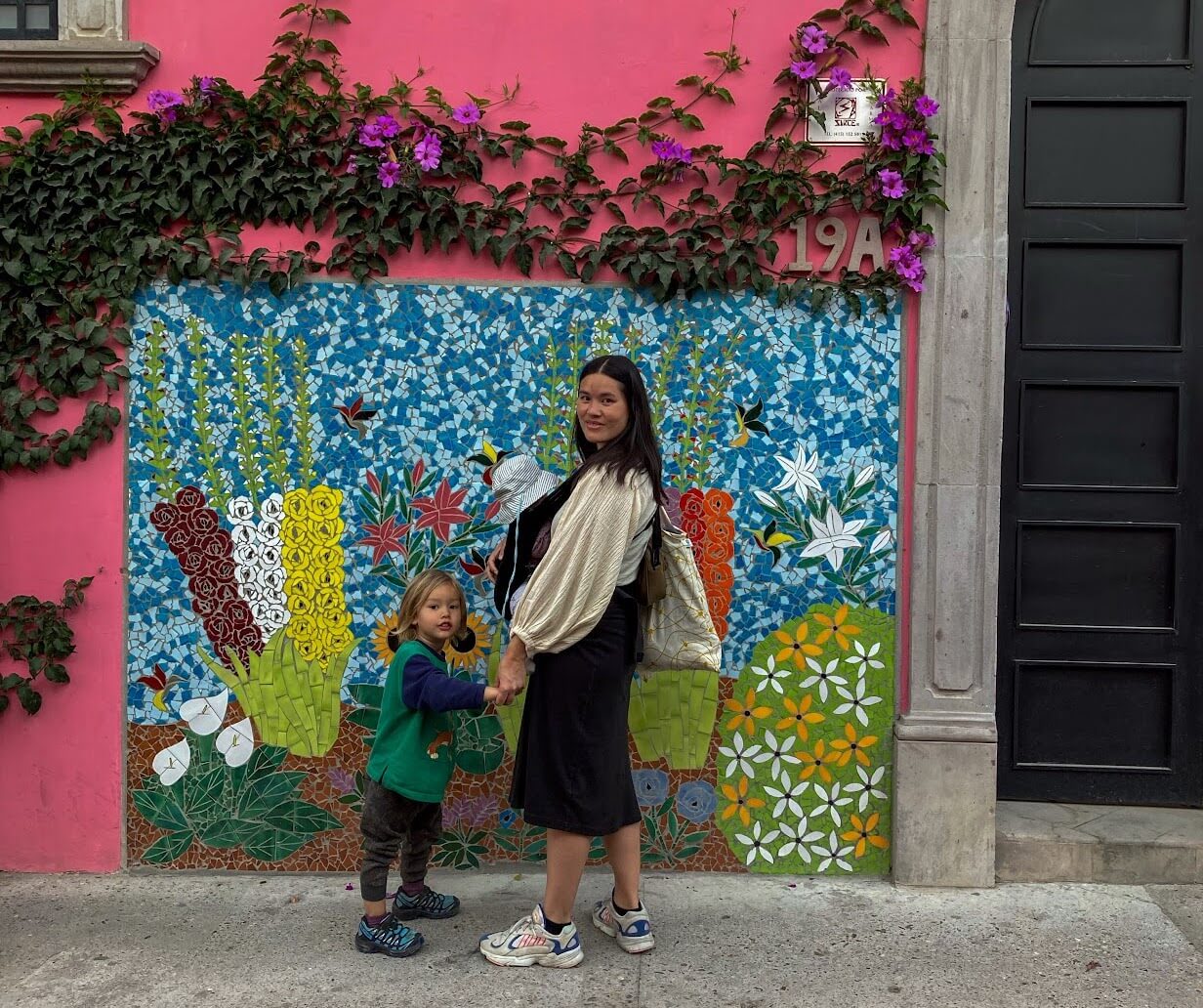
A few notes on how to thrive as a digital nomad family

Digital nomads as a term have really taken off the last 10 years and thousands of those young people traveling and working from a beach are now becoming parents. We are one of those families.
We traveled 4 years full-time before having kids while working on startups and freelancing and before that, we lived a year in China. Now we have two small kids and we are on our first major trip for 6 months (2 months in the Alps, 4 months in Mexico).
I mostly consider being a digital nomad as a tool to experiment with different ways of living. These experiments give a lot of experience and I regret not writing more notes about it when we traveled before kids. So I went ahead and did it on this trip. The notes are not a “how-to” guide, it’s not the final truth, it’s based on small kids and it’s more or less just my personal notes – so take them for what they are.
Having the freedom to go back home if that is needed
Of course, we travel because it’s something we, the adults, want. But it should always be based on what is good for the kids. Being location independent also means you have the freedom to do what is best for the kids. This also means the freedom to go back home if that is the best. Let’s say that we couldn’t find anything social for our son and it was a big problem for him, then we would have the freedom to go back home. That takes off some pressure.
Having a base is best for us
We have been asked a few times why we are not one month at the beach, one month here, and one month there when we can do that. We tried it, it’s fun for a few years, but the great potential in digital nomadism is not traveling the whole time. It’s the freedom to live somewhere else, to do what is right for you and your family, and build a lifestyle based on what makes you click.
Even before kids we realized that we liked living abroad for a period much better than the image that the press often creates of digital nomads as people working from a beach.
Now we are 4,5 months (at least) in Mexico City. We could set up routines with work, training, we met some incredible people and we don’t have to learn anything again in 2 weeks because we are not moving. We can take small trips (or not if the energy is not there), we get to know the place really well and we also have a bit of time to get bored, which I think is important.
Making day-to-day work
With two kids full-time, work that needs to be done and being in a whole new country, it can easily be quite a lot and pretty exhausting (another reason why it’s better to stay in one place longer). I remind myself about these things:
- With kids in tow, you will never do everything you dream about. Don’t stress and don’t be hard on yourself.
- Find joy in the small things when just taking a walk to the park. That’s more than enough for kids and adults can learn from that. We don’t have to see a new UNESCO sight all the time.
- Create a combined to-do and done list, not just for your work but for the whole day, so what’s important gets done. Including deep play, reading a book, and so on. With kids full-time, a day can truly just vanish and at 10pm you sometimes think “what the hell happened today”, so use the list to be mindful about what you actually want to achieve, because if you don’t proactively make a decision the day is just going to vanish. Also use the done section of the list to actually be happy about what you achieve, because the day could just as easily have vanished into thin air.
Building structure
Being location independent, free from meetings and 2 kids full-time is the recipe for life without structure. Most people get a lot of structure through their work with fixed meetings and so on. We have the luxury of not really having to adjust to anyone’s structure, but having no structure is not good.
We try to build a structure with training, work, and the different parts of the day. The structure is never fixed Monday to Friday, so it really helps writing a list of what we want to get out of the day. Monday to Friday we normally try to do some training in the AM and that my wife gets a work block where I have the kids. This leaves room for adjusting more later in the day when everyone is tired.
We always eat dinner at home and after dinner, it’s quiet time with no screens (only for reading and audiobooks) and everyone has the right to do their own thing (our son sleeps 9-10pm, so we have quite a big block of time between dinner and bed).
There is a lot of hours in a day, but with this lifestyle, you have to be super mindful about how to use all those hours.
How to actually relax
Relaxation is not the word most often used when talking about having small kids. We have our kids home full-time (no daycare, no school) and at the same time, we want to work and to live abroad for a period. There are things we want to do, things we want to see, and many things that are new.
But everyone needs to relax and this lifestyle will never work if it’s just hard work. In other words, we need to learn to relax and do the things we want to do with our kids present.
This means that we practice for example reading a book and writing while the kids are here instead of waiting until they sleep or until we have focused time (every focused hour we have results in the other having two small kids alone). I also want to do a lot of training (bouldering and running), but if I needed to do all that alone then it would be a big toll on my wife. The alone time I can get I mostly need for working. So I always bring our son to bouldering and I also bring him running a few times per week in his stroller (a little hard in Mexico City).
Prioritize meeting people as if you were staying multiple years
When we traveled without kids we never really prioritized and did the work to meet other people, which resulted in us feeling quite lonely multiple times.
One big downside of complete freedom is that it’s easy to live quite a lot out of sync with other people. But there is a lot of happiness in being in sync with people you care about and are interested in.
When we went to Mexico we wanted to be super proactive about meeting new people and building some relations, because it was also important for our son to have something social. This is again a reason to stay in the same place for longer periods.
Building some relationships is always worth it, but will also make the whole period be a more whole memory and make it something to look back at with joy.
Prioritize the relationship between the adults
Kids are so good at adapting. You can literally move to the other side of the planet and they are just like “fine, whatever”. For small kids, stability is being their parents. If they have their parents, they can really adapt to a lot with very few challenges.
The most important relationship in a family is the one between the adults because that is what the kids have to navigate in and it’s the whole foundation for them thriving.
This also means that when traveling it has to be done in a way that doesn’t strain the relationship between the two adults in the family. This is a good reminder to adjust expectations, to stay in one place longer, and to do it in a way that you actually want instead of it becoming a bucket list thing. This also means some clear agreements about work, alone time, who does what – But I guess that goes for all families.





